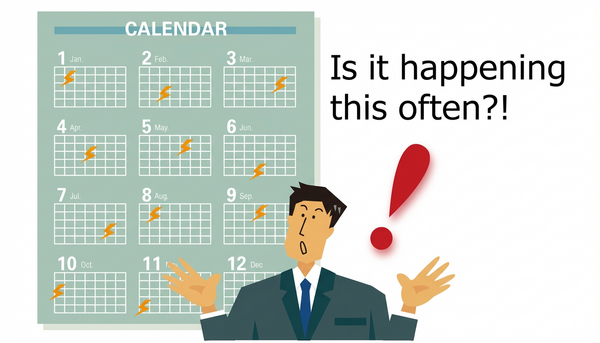



-
- Free Word Search




UPS(無停電電源装置)とは,停電や瞬時電圧低下(瞬低)など電源トラブルが発生した際に,電気を一定時間供給し続けるための装置です。英語では「UPS(Uninterruptible Power Supply)」と呼ばれています。
このUPS(無停電電源装置)があることでパソコンやハードディスク,サーバ,モデム,ルータなどを予期せぬ停電から守ることができ,ひいては重要なデータや製造機器も守ることができます。

First, electricity is sent from the power source to the UPS (Uninterruptible Power Supplies). The electricity is then sent straight to the equipment connected to it, and at the same time the electricity is stored in a storage battery inside the UPS (Uninterruptible Power Supplies). Then, in the event of a power outage or other emergency, power is supplied from the storage battery to each device. This allows the supply of electricity to continue without interruption for even a moment.
Imagine an extension cord that is commonly used in offices and homes. It is a cord that connects to a power source in the wall and has multiple outlets at the end, which send electricity to the devices connected to it. It is easy to understand if you think of a UPS (Uninterruptible Power Supplies) as an extension cord with a storage function.
UPS(無停電電源装置)と発電機は,どちらも停電時に電力供給を行う装置です。
主な違いは,電力供給までの時間,また電力供給をし続ける時間にあります。
UPS(無停電電源装置)は蓄電池を内蔵しています。万一,停電が起きたときには,蓄電池からの給電に自動で切り替わるので,切れ目なく電力を供給し続けられるのが特長です。ただし,一般的なバックアップ時間は5~10分程度なので,長時間の停電には耐えられません。システムの安全なシャットダウンや発電機が起動するまでの繋ぎとして利用するといいでしょう。
Generators are generally started only after a power outage occurs. It takes about a minute for them to actually start generating electricity, during which time the supply of electricity to various devices is halted. On the other hand, generators can continue to generate electricity as long as they have fuel such as gasoline or diesel, making them effective in the event of a long-lasting power outage.
UPS(無停電電源装置)は,停電などの電源トラブルによって発生するシステムの停止,データの喪失,機器の故障といった重大なリスクを回避するために,電力を安定して供給する重要な装置です。
UPSは,企業や行政機関を問わず,現代社会において欠かせない存在です。
UPS(無停電電源装置)が必要になるのは,停電や電圧低下が発生したときです。日本では長時間の停電はまれですが,「瞬時電圧低下(瞬低)※1」や「瞬時停電(瞬停)※2」といった短時間の電力トラブルは頻繁に発生しています。
たとえば,東京電力の2021年度データによると,1軒あたりの停電回数は年間0.1回※3と少ない一方で,瞬低は地域によっては月に1回以上発生することもあります。
こうした短時間の電源トラブルでも,工場の生産ライン停止やオフィスのサーバの停止,データの喪失などのリスクがあります。UPSは,これらの被害を未然に防ぐために,非常に重要な役割を果たします。

※1 瞬時電圧低下(瞬低)…0.02秒~2秒の短時間の電圧低下
※2 瞬時停電(瞬停)…1分未満の電力停止
※3 出典 1軒あたりの停電回数|数表でみる東京電力
UPS(無停電電源装置)は地震や台風,火災といった災害時にも,予備電源・非常電源装置として重要な役割を果たします。
災害による停電は長時間に及ぶことがあります。UPSの一般的なバックアップ時間は5~10分ですが,この時間内にシステムやパソコンの安全なシャットダウン行うことで,データの喪失や機器の損傷を防ぐことができます。またUPSと発電機を併用することで,より長時間の電力供給も可能になります。
UPS(無停電電源装置)には,用途や設置環境に応じてさまざまな種類があります。
ここでは「給電方式」と「バッテリーの種類」について解説します。
UPSの給電方式は,電力の供給方法や切り替えの仕組みによって以下の3つ※4に分類されます。
※4 山洋電気のUPSの場合。メーカーによって給電方式や呼び方は異なります。
商用電源をそのまま装置に供給する方式で,停電時は商用電源を切り離した後,蓄電デバイスの直流電力をインバータで交流電力に変換し,電気機器に供給します。電力変換のロスが少ないですが,切り替え時にわずかな瞬断が発生します。
用途例として,監視カメラなど一時的な瞬断が許容される機器に適しています。
Details page: What is Passive Standby UPS?
常にインバータを通して,電気を電気機器に供給する方式です。停電時には完全無瞬断で電力を切り替えるため,給電品質と信頼性の高い給電方式です。
用途例として,通信基地局,通信サーバなど,品質と信頼性を求めらる装置に適しています。
Details page: What is Double Conversion Online UPS?
インバータを常に並列状態で運転し,電力波形を高速で補正処理する方式です。電源側の電力品質を改善しつつ,停電時には完全無瞬断で電力を切り替えます。
用途例として,生産設備や動力機器など,高効率と高品質が求められる現場に適しています。
Details page: What is Parallel Processing UPS?
For a list of specific products, please see" SANYO DENKI 's Uninterruptible Power Supplies (UPS) Product List."
UPSに搭載されるバッテリーは,主に以下の2種類です。
※5 使用環境や周囲温度によって異なる
Details page: A thorough comparison of UPS lithium-ion batteries and lead-acid batteries!
UPSを選ぶ際は,使用目的や設置環境に応じて,以下のポイントを確認することが重要です。
Details page: How to choose a UPS (Uninterruptible Power Supplies)! Capacity, backup time, etc.
UPSの比較する際は,以下のような性能や機能を見ると,最適なUPSを選びやすくなります。
詳細ページ:UPS(無停電電源装置)を比較する際に見るべき性能やスペックとは?
日常点検や定期点検の中で,バッテリーなどの保守部品の交換や,稼働環境の確認等をしっかりと行うことが大切です。
UPS(無停電電源装置)は適切なメンテナンスを行うことで,安全に使用し続けることができます。
UPS(無停電電源装置)の寿命は,容量や使用環境によって異なりますが,5年~15年が目安です。
寿命を過ぎたUPSを使用し続けた場合,故障リスクが高まり,非常時に電力を供給できない可能性があります。また,保守費用が増加するなどの問題も発生してしまいます。寿命を超えたUPSは,適切なタイミングで買い替えを検討しましょう。
UPS(無停電電源装置)の代表的な用途を紹介します。
パソコンは,突然の停電でデータが消失したり,システムが破損するリスクがあります。UPSを使えば,停電時にも電力を供給し,安全にシャットダウンする時間を確保できます。業務継続が必要な場合は,UPSと発電機の併用も有効です。
サーバは,システムやWebサイト,メールなどの重要なデータを管理しています。UPSを導入することで.停電によるシステム障害やデータ喪失を防止できます。
さらに,UPSとサーバをLAN接続し,例えばUPSのバッテリー残量に応じて,サーバが自動シャットダウンする仕組みを構築することで,より安全な運用が可能です。
製造業や工場では,停電によって生産設備が停止したり,製品が破損するリスクがあります。UPSを導入することで,生産ラインの停止や損失を最小限に抑えることができます。
病院などの医療現場では,医療機器やワクチン保冷庫など,電力が途切れると大きなリスクにつながる機器が多数あります。UPSは,これらの機器に安定した電力を供給し続けるために不可欠です。
金融の現場にも,UPS(無停電電源装置)は必須です。銀行や証券会社などの金融関係企業では,複数系統のUPS(無停電電源装置)を導入しています。それだけでなく,それぞれの無停電電源装置を別々の場所に設置。災害時にも電気を安定的に供給できるシステムを構築しています。
執筆協力:山洋電気株式会社 営業本部 シニアセールスエンジニア 西澤 敏幸 /営業本部 シニアテクニカルアドバイザー 博士 泉谷 清髙
更新日:/公開日: